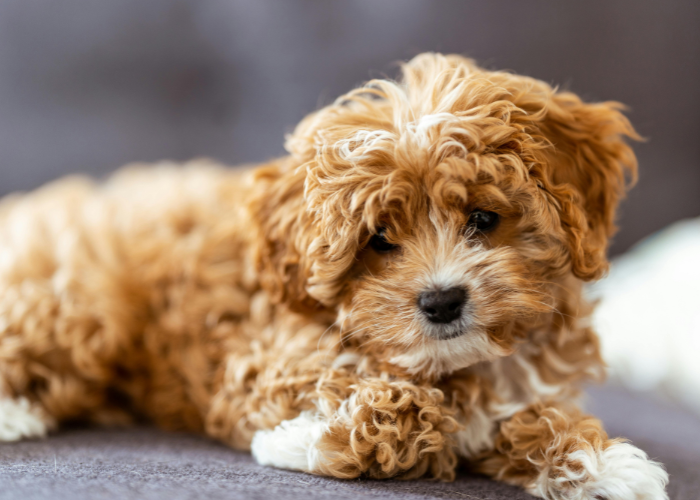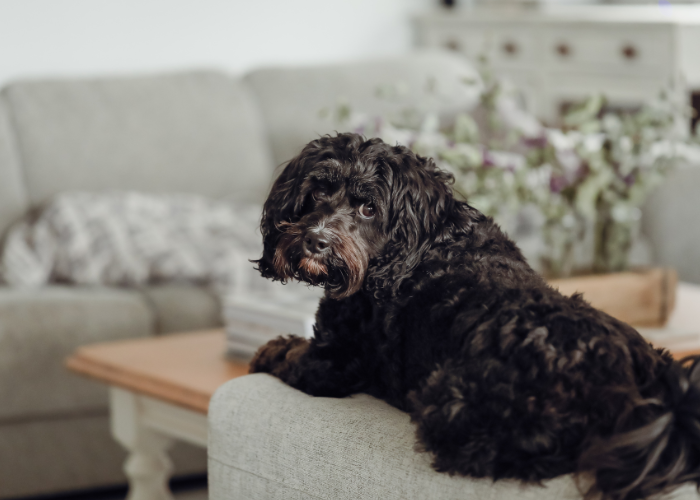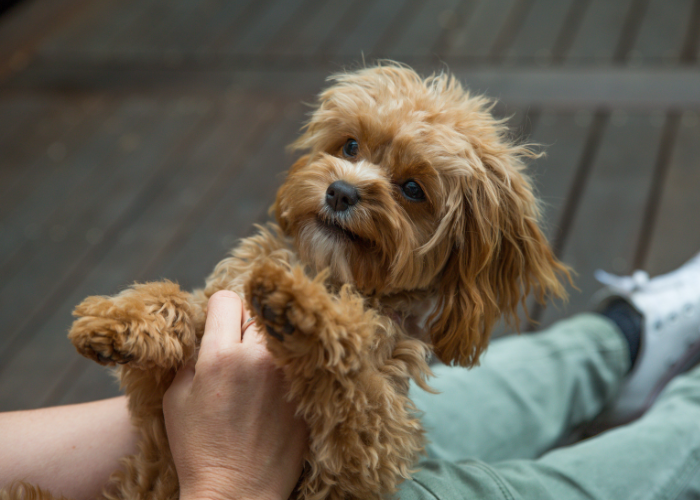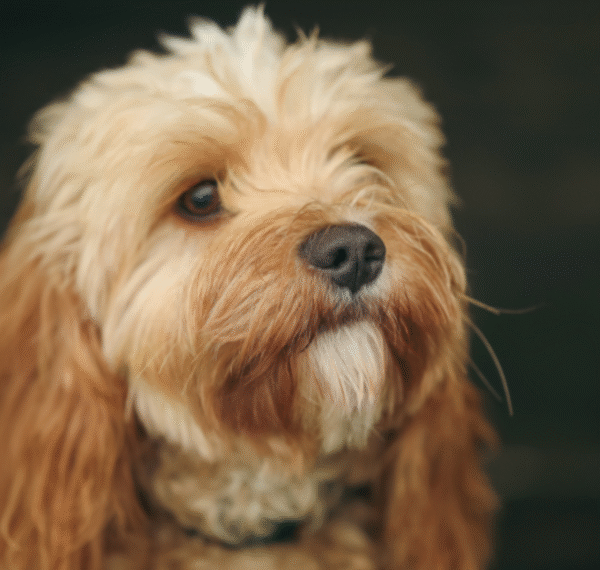Cavoodles are an intelligent breed, making them highly responsive to training. Like most dogs, a bit of knowledge and consistent effort can make the process much smoother.
Cavoodle

About me
The Cavoodle, also known as the Cavapoo, is one of Australia’s most popular designer dogs, loved for its affectionate nature, playful spirit, and family-friendly temperament. This breed is a cross between the Cavalier King Charles Spaniel and the Poodle, combining the Cavalier’s calm, easygoing charm with the Poodle’s intelligence and loyalty. Together, these traits create a small companion dog that is gentle, clever, and full of personality.
Cavoodles are incredibly adaptable, thriving in houses, apartments, or country settings. While they’re small in size, they have big personalities — often alert enough to bark at strangers, yet so friendly they’ll likely shower them with kisses moments later. Their loving temperament makes them excellent pets for children and great additions to active households. However, they don’t enjoy being left alone for long periods and may develop separation anxiety.
Playful and lively, Cavoodles need daily exercise to stay happy and healthy. Around 30 to 60 minutes of walks, fetch, park visits, or mental stimulation is generally ideal. Without enough activity or enrichment, they can become bored and may resort to destructive behaviours like chewing. They also enjoy socialising with other dogs, making them great companions at dog parks.
Cavoodles are often described as hypoallergenic, making them a good choice for allergy sufferers. While they don’t shed much hair, their coats require weekly brushing along with regular trimming and professional grooming to stay neat. Owners should also keep an eye on their ears, which need cleaning, and monitor their dental health to prevent tartar build-up.
This breed is generally healthy, with an average lifespan of 12 to 15 years, but like all dogs, they can be prone to certain conditions. Common health concerns include dislocating kneecaps, cataracts, epilepsy, and some skin issues. Scheduling routine veterinary check-ups every six months will help detect and prevent problems early.
Ultimately, Cavoodles are affectionate, intelligent, and loyal dogs that thrive when included in family life. Whether you’re looking for a snuggly couch buddy or a playful partner for daily adventures, the Cavoodle offers endless love, energy, and charm — all wrapped up in one adorable little package.
Temprament
- Affectionate, playful, gentle, intuitive
Size
- Small to Medium
Compatible With
- Cats
- Dogs
- Children
Coat Type and Colours
- Wavy to curly coat
- Cream
- Gold
- Black
- Brown
- Tri-colour
Energy Level
- Moderate and High
Origin
- Australia
Grooming Needs
- Moderate to High
Lifespan
- 12 to 15 years
Cavoodle Personality
Cavoodles are wonderful family pets thanks to their affectionate, loyal, gentle, and people-focused temperament. They usually get along with children, seniors, and other animals, making them excellent companions. That said, we always advise supervising interactions between pets and kids, no matter the breed. Like many dogs, they may show signs of jealousy if their owner spends too much time with another pet, though this can be avoided by giving both pets equal attention.
Energetic and loving, Cavoodles thrive when trained with consistency, patience, repetition, and positive reinforcement. Mental and physical enrichment is key to preventing boredom in this active breed.
These dogs are highly social and love being in the company of people or animals, as constant interaction helps them feel secure. However, this strong attachment can sometimes lead to separation anxiety if left alone too often.
Cavoodles are naturally inquisitive and very alert to what’s happening around them. They often enjoy acting as watchdogs, which can make them inclined to bark at unfamiliar people or potential threats. With proper socialisation, they quickly learn to relax once they recognise someone as friendly.
Although Cavoodles share common traits, their mixed heritage makes their personalities varied and sometimes unpredictable. Each dog is unique in its own way. Those leaning more toward their Poodle lineage may show a streak of independence, while those resembling the Cavalier King Charles Spaniel side are often more laid-back and calm.


Feeding and Nutrition
Cavoodles are a small-sized breed and typically need less food, making it essential to provide a premium dry formula that is complete and balanced. Since they usually eat only small portions at a time, their diet must deliver all the vital nutrients. Many dog food brands offer specialised recipes for small breed adults with appropriately sized kibble. These diets should include the right mix of protein, fats, and carbohydrates along with vitamins, minerals, and antioxidants to support overall health. It is always best to schedule a vet visit to confirm the most suitable, well-balanced diet for your dog.
During puppyhood, it’s recommended to feed them life-stage specific small puppy food. Young pups need meals higher in calcium, while older growing dogs benefit from diets containing more protein. The Petbarn Food Finder is an excellent resource for exploring the different puppy food products available. Review the options and speak with your local veterinary team to decide on the most appropriate nutrition plan for your Cavoodle.
Cavoodles need a balanced, nutrient-rich diet tailored to their size and activity level.
- Choose high-quality dry food with protein as the first ingredient
- Mix in some fresh veggies or cooked meats as treats
- Avoid feeding them table scraps or foods with high fat content
- Always ensure they have access to fresh water
Training & Socialisation
Cavoodles are intelligent, eager-to-please dogs, which generally makes training a rewarding experience. Their smart Poodle heritage combined with the Cavalier King Charles Spaniel’s gentle nature means they respond well to clear instruction and encouragement. Consistency is key, and using positive reinforcement such as praise, treats, and play helps them pick up commands quickly. Short training sessions repeated regularly are best, as Cavoodles can become restless if lessons drag on. Patience and persistence are important, and starting early sets the foundation for good behaviour into adulthood.
Socialisation is equally vital for Cavoodles, as they thrive on interaction and companionship. Introducing them to a variety of people, environments, pets, and everyday noises from an early age will help them grow into confident, well-mannered dogs. Socialisation also helps minimise unwanted behaviours such as excessive barking or nervousness around strangers. Puppy preschool or group obedience classes can be a great way to encourage positive habits while giving them the chance to play with other dogs. With proper training and socialisation, Cavoodles develop into happy, adaptable, and well-balanced companions.
Thanks to their Poodle lineage, Cavoodles are super smart and easy to train.
- Pick up basic commands quickly
- Respond well to praise and treats
- Early socialisation helps prevent shyness
Use Clickers – Keep sessions short, fun, and consistent. They thrive on encouragement!

Is the Cavoodle Right for You?
Ideal for:
- Families with children
- Seniors or retirees
- Apartment or townhouse dwellers
- First-time dog owners
Not ideal for:
- People away from home most of the day
- Those looking for a highly independent dog
If you’re after a loyal, low-shedding, affectionate companion, the Cavoodle could be your perfect match.
Living With a Cavoodle
Living with a Cavoodle is a joyful experience, as they are affectionate, playful, and love being part of the family. These dogs adapt well to various home environments, whether you live in a spacious house or a smaller apartment. What matters most is that they receive plenty of companionship and attention each day. Cavoodles enjoy being close to their owners and can become unsettled if left alone for long periods, so they are best suited to households where someone is home most of the time. Providing toys, interactive games, and daily walks helps keep them content and engaged.
Their moderate exercise needs make Cavoodles relatively easy to care for, though they still require regular activity to stay healthy and prevent boredom. They are well-suited to family life, happily joining in play with children or relaxing with older members of the household. Cavoodles likes to make friends with other pets when they are introduced properly.
Their affectionate nature and adaptability mean they quickly become treasured companions. With the right balance of love, training, and routine, living with a Cavoodle brings warmth, laughter, and endless loyalty to any home.
Whether you live in a spacious home or a cosy apartment, Cavoodles adapt easily.
- Apartment-friendly
- Perfect with kids and seniors
- Handle weather fairly well (just avoid intense heat)
They enjoy moderate daily exercise — a couple of walks and a play session will keep them content


Grooming & Care Tips
Cavoodles have soft, often curly coats that require consistent upkeep to keep them healthy and comfortable. Brushing their coat three to four times each week is recommended to prevent tangles and mats from forming. Regular brushing also reduces shedding and keeps their fur looking clean and shiny. In addition to home care, professional grooming is essential every six to eight weeks. A groomer can trim their coat, tidy up around the face and paws, and check for any skin concerns, helping your Cavoodle stay neat and well-maintained.
Oral hygiene is another important part of Cavoodle care, as small breeds are more prone to dental issues. Brushing their teeth regularly and providing dental chews helps to prevent plaque and bad breath. Their floppy ears also need special attention, as they can trap moisture and become susceptible to infections. Keeping their ears clean and dry will reduce the risk of irritation or discomfort. By maintaining a consistent grooming routine, you not only keep your Cavoodle looking its best but also support their overall health and wellbeing.
Their soft, curly coat may not shed much, but it still requires regular upkeep.
- Brush 3–4 times per week to prevent knots
- Professional grooming every 6–8 weeks
- Regular teeth cleaning
- Keep ears clean and dry to prevent infections
A grooming routine helps them stay healthy and looking adorable
Health & Common Issues
Like many mixed breeds, Cavoodles can be predisposed to certain hereditary health concerns, so it’s important for owners to be aware and proactive. From their Cavalier King Charles Spaniel lineage, heart murmurs are a possible issue that may appear later in life. They can also be at risk of Progressive Retinal Atrophy (PRA), an eye condition that gradually impairs vision. In addition, patella luxation, or slipping kneecaps, is relatively common in smaller breeds and can cause discomfort or mobility problems if not managed early.
Routine veterinary visits and preventative health screenings are vital in detecting these conditions before they progress. Regular check-ups help ensure any emerging problems are identified and treated promptly, giving your Cavoodle the best chance for a long and healthy life. Supporting their joints with products such as Joint Care Chews may also assist in maintaining mobility and comfort as they age. With attentive care, a balanced diet, and a healthy lifestyle, Cavoodles can thrive as happy, active companions for many years.
Like all breeds, Cavoodles can be prone to certain inherited health conditions:
- Heart murmurs (especially from the Cavalier side)
- Progressive Retinal Atrophy (PRA)
- Patella luxation (slipping kneecaps)
Regular vet check-ups and early health screening can make all the difference. Support joint health with Joint Care Chews

How to care for your Cavoodle
Cavoodles are highly adaptable and can comfortably live in almost any setting, whether it’s a house, apartment, condo, city, or rural environment. Being closely linked to the Cavalier King Charles Spaniel, a breed well known as a lap dog, many Cavoodles are content to spend plenty of time relaxing on the sofa. While every dog is unique, Cavoodles typically need a moderate level of activity each day, usually between 30 and 60 minutes. This may include regular walks, free play in a park, or activities that provide mental stimulation. Without enough exercise and environmental enrichment, Cavoodles are more prone to developing unwanted habits such as chewing household furniture. If you are worried about behavioural issues in your dog, it is best to consult your veterinarian, who can offer useful training techniques and additional guidance tailored to your pet’s specific needs.
Cavoodle FAQ's
Final Woof
Whether you’re curled up on the couch or going for a beach walk, the Cavoodle is always ready to join in. With their winning combo of smarts, sweetness, and fluff, it’s no surprise they’ve captured the hearts of pet lovers.







